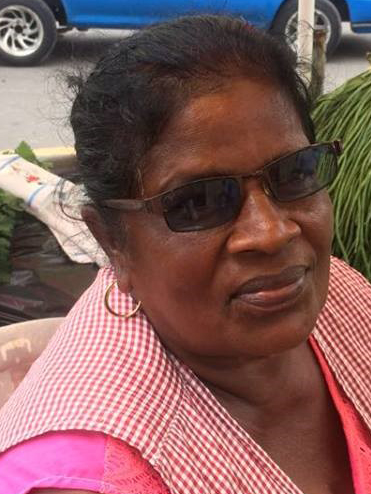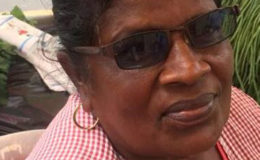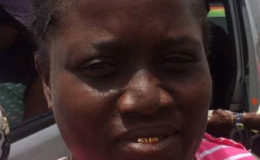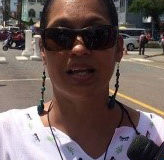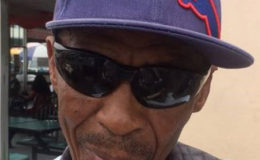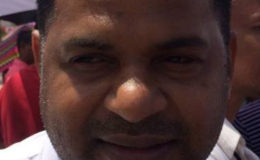Photos and interviews by Oliceia Tinnie and David Papannah
In light of the upcoming international women’s day we asked the man and woman in the street their thoughts on the progress of women.
`I think women have made progress in Guyana but I must say that time is so hard that the progress is not being seen. The women are trying to make it, because we see more of them on the streets doing business, driving bus, conducting bus. They have come a far way because years back women weren’t really going in search of jobs. A majority of the women who clean the society are women. However, a lot of women are still struggling because times are so hard.’
Trevor Wills
 `I really believe that women have made a lot of progress in today’s society so much so that their rights have become unequal to men. For example in domestic violence cases a woman can file a report against a particular man stating that he abused her, either verbally or physically and that person would be arrested without substantial evidence. There are a lot of women in different fields like engineering, taxi drivers, construction workers. Women are now in a lot more of what was the male dominated job. I think it’s more of a sense of independence for these women than a struggle.’
`I really believe that women have made a lot of progress in today’s society so much so that their rights have become unequal to men. For example in domestic violence cases a woman can file a report against a particular man stating that he abused her, either verbally or physically and that person would be arrested without substantial evidence. There are a lot of women in different fields like engineering, taxi drivers, construction workers. Women are now in a lot more of what was the male dominated job. I think it’s more of a sense of independence for these women than a struggle.’
`I believe women have made a lot of progress as compared to years ago. For me, I’m an electrician and a bus conductor and even went to school to the end. I think more small businesses ought to be developed to encourage more women to work. Day to day I face discrimination from male conductors because they don’t feel like women ought to be out there doing that job. Despite the discrimination I still push and work.’
`Women have made significant strides, in Guyana we see women in all different facets of life. One of the concerns we have that needs to be addressed is the amount of persons that are convicted in relation to rapes. This is an issue with the justice system that ought to be resolved. I work in an environmental field, in my area I have not faced much discrimination in regards to my gender but I know it happens in other areas. I’ve heard women in business and some other areas being discriminated against. If we look at a lot of the business boards they are mainly dominated by men and have very few women. But we’re getting there little by little, if you look at the indigenous people there are a lot more female Toshaos now and more females on the councils, so we can see the improvements. We have to keep an eye on the progress and ensure that both men and women are educated and that we come together. If we are going to solve some of the problems that we have today we must work with both boys and girls.
`These days I’ve noticed that a lot of women are getting jobs like the men and in the past this never used to happen because certain jobs didn’t take women. I think some of the challenges they face comes in the form of their children, some men’s monies aren’t enough to meet the needs of the children so the women have to step in. During my days I only know about housewives but now they have to come out and work. I think they see this as independence because they don’t have to depend on anybody, they look for their own. When I was small my mother had to stay home and clean the house that was her job, now it’s different. As time goes it will become stronger for them, because any type of job they are doing now, mason, carpenter, anything. I think the man should support the women as well and not back out. Some men leave a woman with four or five children and it’s hard to fully support them. Right now progress is being made, it might look a little slow but the majority of women are not depending on people.’
`Let’s start at the schools, the levels of dropout males in comparison to females is much higher and we see the women going ahead to become qualified for professions hence they are the qualified ones to do the jobs in the workplace. Without measure the progress of women is exponential and continues to grow. They bring a different set of skills, a different set of temperament, always adding value to any developmental organisation. Challenges are faced by everybody both males and females and there are different ways of addressing those challenges for either the male or female. Education, trade, small business, trade certification, will aid in getting women who may be poor into business- self-help’.
`I believe that women in the past have been disrespected and it happens to some extent now. What I like is that more women are coming out in society today and showing that they do deserve a place in society. There are a lot of women who are being bold and women who are coming out in a number of senior positions. I’ve known a lot of women who have gone up the corporate ladder and I believe that they have made significant changes over the years. I believe that society as a whole ought to accept women and women power on a whole. Women have a unique way of how they do things, how they lead and how they would speak to persons as compared to the way a male may do that. I believe that they should be respected for that and be honoured for that. We should also recognise when those things are done.’
`I believe women have made a lot progress because now they’re out working and are more independent than before. Long ago the females use to stay home and work while the males went out to work but now that’s not the case. Women have to work now because of the way society is and the need for their independence. I don’t view this as a struggle all the time because sometimes women have to venture into the working field because the male’s salary is too low. As they say two hands clap and not one, so we have to go out and assist to pay bills or something. Some women want to be independent mainly because they don’t want to be dependent on anyone. Some women are discriminated against especially if they drive a bus or a car, persons, especially males think that they are reckless or that they’re driving won’t suit them.’
‘I believe that women have not only now begun to make contributions in society but have always made contributions in society. We as women and we as a whole have to acknowledge that before there were any amendments in the laws or any realization that women had started to do great things in the workplace before the housewife or the mother at home, made these developments. Because without the supporting and keeping the home together the men would not have been able to get out there. Mothers hold the home so that their daughters can go out into the new generation and be independent and I think that all daughters everywhere ought to recognise and appreciate that. As it relates to where we are today, we have significantly made contributions. The fact that only now people have started to recognise and the workplaces have now started to open up to contributions from women is actually a very positive thing. Something that is incredibly encouraging is the education because in UG women are now taking on their education in significant ways and this is something that needs to be encouraged. The contribution that women make is also, though not heavily dependent, is still dependent on males. We feminists like to ignore the male contribution because all of the strong women that I personally know, they have become strong because of the result of having positive father figures in their homes. The women of today, especially those that are strong and ambitious and have very strong portfolios their husbands are very supportive. Women are significantly challenged however, despite the progress. Despite the challenges women ought not to step down, they should not be intimidated by it, do not use it as a sign that their ideas are not welcomed. Women, despite the challenges, ought to keep pressing on, keep making contributions that are based upon facts and never forget the emotional element when making decisions as a leader. This is one of the advantages that women can bring to the country and as leaders.’
Derwayne Wills
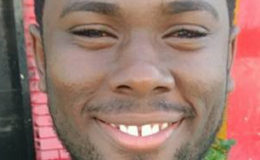 `In order for us to assess the women in 2017 and how much progress they have made we cannot shy away from the need of empirical evidence to support same. I know in 2002 after the census was completed there was a particular section of the data uploaded on the Stats Bureau website which spoke specifically to the position in Guyana. That sort of thing was supposed to come out again for the 2012 census but the Stats Bureau has been a little slow in putting out that information. In 2002 there was information relating to the sexual division of labour, women in leadership, how many women are actually part of the labour force, how many women are actually employed and how many are seeking employment. Now all this information pulled together helps us to understand all that’s happening in terms of our poverty. When we look at our statistics most of the households in Guyana are headed by women and if women don’t have access to jobs or if they’re not being paid well or may not have a reasonable position to sustain not only themselves but their families then it’s a national issue. Outside of that, violence against women continues, it’s perpetual, not only physical violence, because in the campaigns we’re stuck on physical violence when they’re other forms of violence which women suffer, psychological, emotional and economic, which is one of the more significant forms of violence against women. When you have a society where, in some households the man is considered the breadwinner he can assert his will in that house and if a woman chooses to go against that will she will be deprived from accessing that money, so that in itself is a form of domestic violence. We also have a situation of state sanctioned economic violence which happened in the case of two media workers, both of these workers were seemingly punished for their motherhood statuses. We really need to look at how we treat mothers not only in the public sector but the private sectors as well. Although our population is more women than men we see more men taking up the leadership roles in our country, there’s a disparity. That’s not to say that women aren’t excelling because in the education system women do better than men and but for some reason the men take up more leadership roles than women. In the media and the political system I’m concerned about the image and vulnerability of women. In the media I’ve seen a woman’s sexual assault being aired in detail for public consumption, which goes against the Sexual Offences Act which protects these women. We really need to look at how we treat women in society and there’s a lot more that needs to be done.’
`In order for us to assess the women in 2017 and how much progress they have made we cannot shy away from the need of empirical evidence to support same. I know in 2002 after the census was completed there was a particular section of the data uploaded on the Stats Bureau website which spoke specifically to the position in Guyana. That sort of thing was supposed to come out again for the 2012 census but the Stats Bureau has been a little slow in putting out that information. In 2002 there was information relating to the sexual division of labour, women in leadership, how many women are actually part of the labour force, how many women are actually employed and how many are seeking employment. Now all this information pulled together helps us to understand all that’s happening in terms of our poverty. When we look at our statistics most of the households in Guyana are headed by women and if women don’t have access to jobs or if they’re not being paid well or may not have a reasonable position to sustain not only themselves but their families then it’s a national issue. Outside of that, violence against women continues, it’s perpetual, not only physical violence, because in the campaigns we’re stuck on physical violence when they’re other forms of violence which women suffer, psychological, emotional and economic, which is one of the more significant forms of violence against women. When you have a society where, in some households the man is considered the breadwinner he can assert his will in that house and if a woman chooses to go against that will she will be deprived from accessing that money, so that in itself is a form of domestic violence. We also have a situation of state sanctioned economic violence which happened in the case of two media workers, both of these workers were seemingly punished for their motherhood statuses. We really need to look at how we treat mothers not only in the public sector but the private sectors as well. Although our population is more women than men we see more men taking up the leadership roles in our country, there’s a disparity. That’s not to say that women aren’t excelling because in the education system women do better than men and but for some reason the men take up more leadership roles than women. In the media and the political system I’m concerned about the image and vulnerability of women. In the media I’ve seen a woman’s sexual assault being aired in detail for public consumption, which goes against the Sexual Offences Act which protects these women. We really need to look at how we treat women in society and there’s a lot more that needs to be done.’

